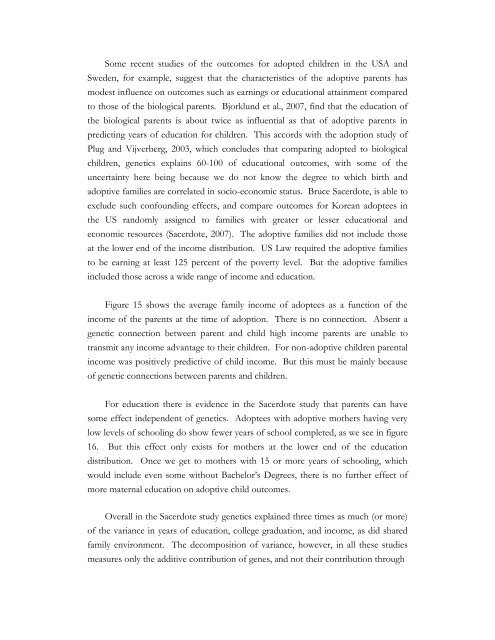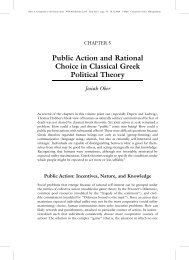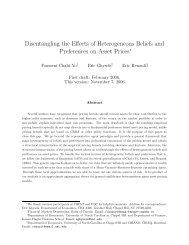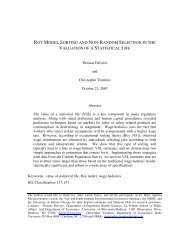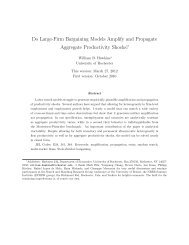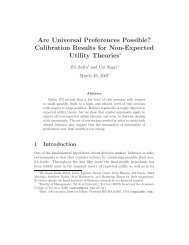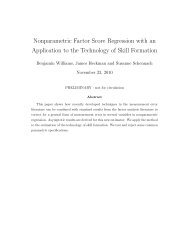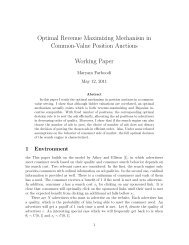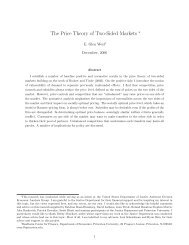Surnames and a Theory of Social Mobility - University of Chicago ...
Surnames and a Theory of Social Mobility - University of Chicago ...
Surnames and a Theory of Social Mobility - University of Chicago ...
You also want an ePaper? Increase the reach of your titles
YUMPU automatically turns print PDFs into web optimized ePapers that Google loves.
Some recent studies <strong>of</strong> the outcomes for adopted children in the USA <strong>and</strong><br />
Sweden, for example, suggest that the characteristics <strong>of</strong> the adoptive parents has<br />
modest influence on outcomes such as earnings or educational attainment compared<br />
to those <strong>of</strong> the biological parents. Bjorklund et al., 2007, find that the education <strong>of</strong><br />
the biological parents is about twice as influential as that <strong>of</strong> adoptive parents in<br />
predicting years <strong>of</strong> education for children. This accords with the adoption study <strong>of</strong><br />
Plug <strong>and</strong> Vijverberg, 2003, which concludes that comparing adopted to biological<br />
children, genetics explains 60-100 <strong>of</strong> educational outcomes, with some <strong>of</strong> the<br />
uncertainty here being because we do not know the degree to which birth <strong>and</strong><br />
adoptive families are correlated in socio-economic status. Bruce Sacerdote, is able to<br />
exclude such confounding effects, <strong>and</strong> compare outcomes for Korean adoptees in<br />
the US r<strong>and</strong>omly assigned to families with greater or lesser educational <strong>and</strong><br />
economic resources (Sacerdote, 2007). The adoptive families did not include those<br />
at the lower end <strong>of</strong> the income distribution. US Law required the adoptive families<br />
to be earning at least 125 percent <strong>of</strong> the poverty level. But the adoptive families<br />
included those across a wide range <strong>of</strong> income <strong>and</strong> education.<br />
Figure 15 shows the average family income <strong>of</strong> adoptees as a function <strong>of</strong> the<br />
income <strong>of</strong> the parents at the time <strong>of</strong> adoption. There is no connection. Absent a<br />
genetic connection between parent <strong>and</strong> child high income parents are unable to<br />
transmit any income advantage to their children. For non-adoptive children parental<br />
income was positively predictive <strong>of</strong> child income. But this must be mainly because<br />
<strong>of</strong> genetic connections between parents <strong>and</strong> children.<br />
For education there is evidence in the Sacerdote study that parents can have<br />
some effect independent <strong>of</strong> genetics. Adoptees with adoptive mothers having very<br />
low levels <strong>of</strong> schooling do show fewer years <strong>of</strong> school completed, as we see in figure<br />
16. But this effect only exists for mothers at the lower end <strong>of</strong> the education<br />
distribution. Once we get to mothers with 15 or more years <strong>of</strong> schooling, which<br />
would include even some without Bachelor’s Degrees, there is no further effect <strong>of</strong><br />
more maternal education on adoptive child outcomes.<br />
Overall in the Sacerdote study genetics explained three times as much (or more)<br />
<strong>of</strong> the variance in years <strong>of</strong> education, college graduation, <strong>and</strong> income, as did shared<br />
family environment. The decomposition <strong>of</strong> variance, however, in all these studies<br />
measures only the additive contribution <strong>of</strong> genes, <strong>and</strong> not their contribution through


